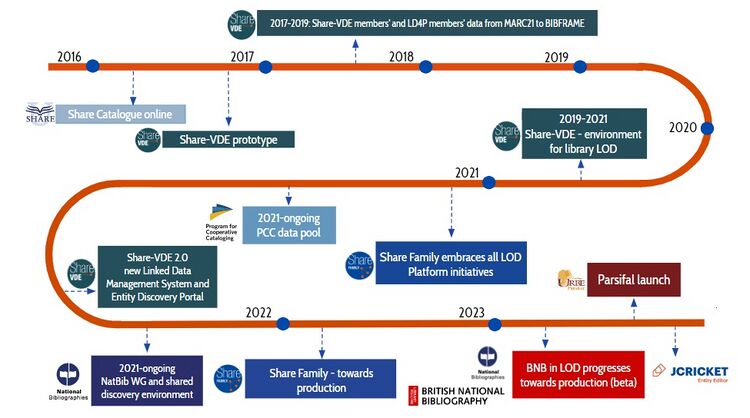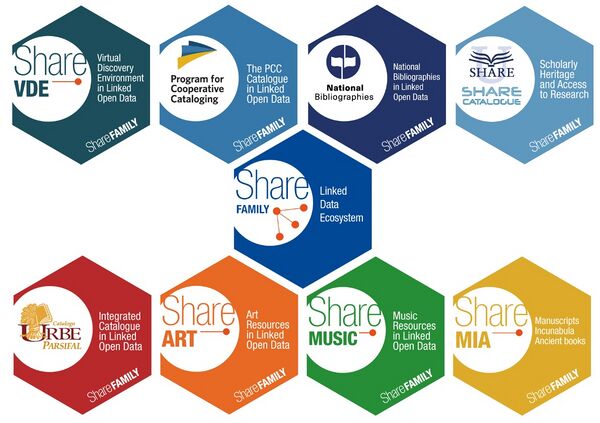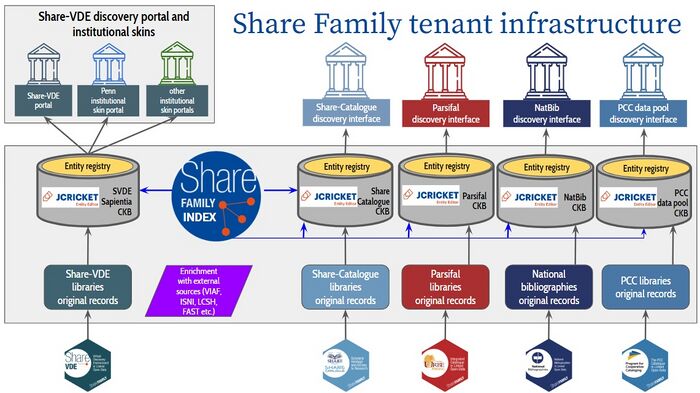Find out the latest news about the Share Family of initiatives and the most relevant updates on the developments going on within the various branches of the family.
Number 8, December 2023
Introduction
As 2023 comes to an end, we take a moment to look back at the achievements and challenges within the Share Family initiative during the past year. This report serves as a comprehensive reflection on the accomplishments of this year, while also offering insights into the exciting goals we've set for the upcoming period. It provides a glimpse into both the highlights of the past year and our shared vision for the future within the Share Family community.
The international reach of the Share Family, spread across different countries and bibliographic traditions, stimulates mutual exchanges and gives us the occasion to improve our processes, data treatment and outputs.
The efforts and resources devoted to the development of the initiative (both technical and in terms of cooperation and outreach) are always rewarded by the added value of working side by side with member institutions and partners in the linked data community. This co-operative approach, with time, expertise and costs shared across the community for the benefit of all members, is creating a truly global network of interconnected institutions and information resources that transcends traditional cataloging boundaries.
A useful perspective on how we carry on this family of initiatives can be found in the Share-VDE Executive Summary: the outline of SVDE role in linked open data for libraries is reflected on the overall approach to all the branches of the Share Family.
In this context, we also find useful to provide a comprehensive overview of the main stepping stones that have marked the path of the Share Family of initiatives over the years, described in detail in the next sections:
In this extensive update are reported - among others - prominent achievements:
- the extension of the community of members and parallel pilots;
- the publication of new branches of the Share Family dedicated to specific initiatives, supported by dedicated entity discovery portals and linked data infrastructure (the portals for the BNB - British National Bibliography, Parsifal, and LILLIT);
- the involvement in the international library and cultural heritage community through cross-institutional working groups;
- the development of JCricket collaborative entity editor for shared cataloguing;
- the continuous enhancement of the system components and upgrade to a new version 3 of the technology in use, towards the support of production workflows;
- the extension of LOD Platform technology capabilities for the integration with third parties.
To cope with all this, the Share Family internal team of metadata experts and technicians is constantly working to improve the internal organisation of work and is increasingly formalising project rules and methodology to streamline development processes and achieve better results.
News from members, promotion and outreach
The Share Family linked data ecosystem comprises several collaborative LOD - Linked Open Data environments (also called “tenants” in Share Family jargon).
The different characteristics of each field represented in the various environments are a useful asset that can be used to the advantage not only of the Share Family as a whole, but for each single discipline.
The tenants currently active and the corresponding discovery websites are:
- Share-VDE (Virtual Discovery Environment);
- SHARE Catalogue - the Italian network of university libraries;
- the PCC data pool - the Program for Cooperative Cataloging (PCC) Catalogue in Linked Open Data;
- National Bibliographies in Linked Open Data;
- Parsifal - the LOD portal of the URBE consortium (Roman Union of Ecclesiastical Libraries).
- LILLIT - portal for Italian illustrated books with Linked Open Data descriptions and illustrations of Italian editions printed in the 16th-18th centuries.
The tenant infrastructure is designed to be flexible, therefore it’s possible to show the data of participating members at the tenant level or even in an institutional customised sub-portal of a pre-existing tenant (also called “skin portal” in Share Family jargon). This can be done according to the institution/consortia’s needs and policies.
The Share Family team is committed to advancing the technical developments of each tenant and also to fostering user engagement through outreach initiatives. Below are reported the main facts around membership and outreach within the Share Family.


